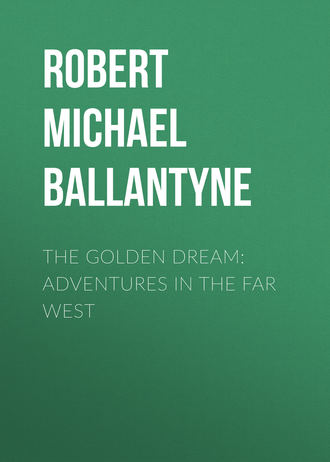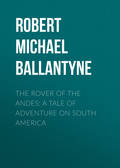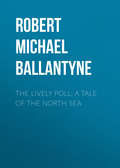
Robert Michael Ballantyne
The Golden Dream: Adventures in the Far West
To flee was their first and natural impulse; but to flee in the dark, over rough ground, and with very imperfect ideas as to the position of the cave’s outlet, was dangerous.
“What is to be done?” ejaculated Tom Collins in a tone that indicated the perturbation of his heart too clearly.
At that moment Ned remembered that he had a box of matches in the pocket of his hunting-coat; so, without answering, he drew it forth, struck a light, and re-ignited the torches.
“Now, Tom,” he said, “don’t let us give way to unmanly fears. I have no belief whatever in ghosts or spirits, good or evil, being permitted to come in visible or audible form to frighten poor mortals. Every effect has a cause, and I’m determined to find out the cause of these strange sounds. They certainly proceed from animal lungs, whether from man or beast remains to be seen.”
“Go ahead, then, I’ll follow,” said Tom, whose courage had returned with the light, “I’m game for anything that I can see; but I confess to you that I can not stand howls, and groans and darkness.”
Notwithstanding their utmost efforts they failed to discover the cause of the mysterious sounds, which seemed at times to be voices muttering, while at other times they swelled out into a loud cry. All that could be certainly ascertained was, that they proceeded from the roof of the innermost cavern, and that the centre of that roof was too high to be discerned by torch-light.
“What shall we do now?” inquired Tom.
“We shall go to the summit of the hill above this cave, and see what is to be seen there. Always look at both sides of a mystery if you would fathom it; come along.”
In a few minutes they stood in open air, and once more breathed freely. Mounting their horses, they ascended the steep slope of the hill above the cave, and, after some trouble, reached the summit. Here the first thing that met their gaze was a camp-fire, and near to it several men engaged in harnessing their horses to a large waggon or van. The frantic haste with which they performed the operation convinced Ned that he had discovered the cause of the mysterious voices, and that he and Tom had been the innocent cause of frightening the strangers nearly out of their wits. So engrossed were they with their work, that our travellers advanced within the circle of light of their fire before they were discovered. The man who first saw them uttered a yell, and the whole party turned round, seized their rifles, and, with terror depicted on their countenances, faced the intruders.
“Who comes here?” shouted one.
“Friends,” answered Ned, laying down his rifle and advancing.
Instantly the men threw down their arms and resumed the work of harnessing their horses.
“If ye be friends,” cried the one who spoke first, “give us a hand. I guess all the fiends in the bottomless pit are lo-cated jist below our feet.”
“Listen to me for one moment, gentlemen,” cried Ned Sinton. “I think I can relieve your minds. What have you heard or seen?”
At these words the men stopped, and looked inquiringly at their questioner.
“Seen! stranger, we’ve seed nothin’, but we’ve hear’d a sight, we have, I calc’late. We hear’d the imps o’ darkness talkin’ as plain as I hear you. At first I thought it was somebody at the foot o’ the hill, but all of a suddent the imps took to larfin’ as if they’d split, jist under my feet, so I yelled out to my mate here to come an’ yoke the beasts and git away as slick as we could. We wos jist about ready to slope when you appeared.”
Ned now explained to them the cause of their alarms, and on search being made, a hole was found, as he had anticipated, close at hand among the bushes, which communicated with the cavern below, and formed a channel for the conveyance of the so-called mysterious sounds.
“And now,” said Ned, “may I ask permission to pass the night with you?”
“You’re welcome, stranger,” replied he who seemed to be the chief of the band—a tall, bearded American, named Croft, who seemed more like a bandit than an honest man. His comrades, too, six in number, appeared a wild and reckless set of fellows, with whom one would naturally desire to hold as little intercourse as possible; but most men at the Californian diggings had more or less the aspect of brigands, so Ned Sinton and his companion felt little concern as to their characters, although they did feel a little curious as to what had brought them to such a wild region.
“If it is not taking too great a liberty,” said Ned, after answering the thousand questions put to him in rapid succession by his Yankee host, “may I ask what has brought you to this out-of-the-way valley?”
“Bear-catchin’,” answered the man, shortly, as he addressed himself to a large venison steak, which a comrade had just cooked for him.
“Bear-catching?” ejaculated Ned.
“Ay, an’ screamin’ hard work it is too, I guess; but it pays well.”
“What do you do with them when caught?” inquired Tom Collins, in a somewhat sceptical tone.
“Take ’em down to the cities, an’ sells ’em to fight with wild bulls.”
At this answer our travellers stared at the man incredulously.
“You’re strangers here, I see,” he resumed, “else you’d know that we have bull and bear fights. The grizzlies are chained by one leg and the bulls let loose at ’em. The bulls charge like all possessed, but they find it hard to do much damage to Caleb, whose hide is like a double-extra rhinoceros. The grizzlies ginerally git the best of it; an’ if they was let loose, they’d chaw up the bulls in no time, they would. There’s a great demand for ’em jist now, an’ my trade is catchin’ ’em alive here in the mountains.”
The big Yankee stretched out his long limbs and smoked his pipe with the complacent aspect of a man who felt proud of his profession.
“Do you mean that you seven men catch fall-grown grizzly-bears alive and take them down to the settlements?” inquired Ned in amazement.
“Sartinly I do,” replied the bear-catcher; “an’ why not, stranger?”
“Because I should have thought it impossible.”
“Nothin’’s impossible,” replied the man, quietly.
“But how do you manage it?”
Instead of replying, the Yankee inquired if “the strangers” would stay over next forenoon with them.
“With much pleasure,” answered Ned, not a little amused at the invitation, as well as the man’s brusque manner.
“Well, then,” continued the bear-catcher, shaking the ashes out of his pipe, and putting it into his hat, “I’ll let ye see how we do it in the mornin’. Good-night.”
So saying, he drew his blanket over his head and resigned himself to sleep, an example which was speedily followed by the whole party.
Chapter Twenty.
Grizzly-Bear-Catching in the Mountains—Ned and Tom dine in the midst of Romantic Scenery, and hold Sagacious Converse—The Strange Devices of Woodpeckers
Just as day began to peep on the following morning, the camp was roused by one of the bear-catchers, a Mexican, who had been away to visit the bear-trap during the night, and now came rushing in among the sleepers, shouting—
“Hoor-roo! boy, him cotch, him cotch! big as twinty mans! fact!”
At first Ned thought the camp was attacked by savages, and he and Tom sprang to their feet and grasped their rifles, while they sought to rub their eyes open hastily. A glance at the other members of the camp, however, shewed that they were unnecessarily alarmed. Croft leisurely stretched his limbs, and then gathered himself slowly into a sitting posture, while the others arose with various degrees of reluctance.
“Bin long in?” inquired Croft.
“No, jist cotched,” answered the Mexican, who sat down, lit his pipe, and smoked violently, to relieve his impatient feelings.
“Big ’un?” inquired Croft, again.
To this the Mexican answered by rolling his eyes and exclaiming “Hoh!” with a degree of vigour that left his hearers to imagine anything they pleased, and then settle it in their minds that the thing so imagined was out of all sight short of the mark.
The excitement of the man at last fully roused the sleepy crew, and Croft sprang up with the agility of a cat.
“Ho! boys,” he cried, proceeding to buckle his garments round him, “up with you. Ketch the hosses, an’ put to. Look alive, will you? grease your jints, do. Now, strangers, I’ll shew you how we ketch a bar in this lo-cation; bring yer rules, for sometimes he breaks his trap, an’ isn’t there a spree jist!”
We need scarcely remark, that the latter part of this speech was made to Sinton and his comrade, who were drawing the charges of their revolvers and reloading.
“Is the trap far off?” inquired Ned.
“Quarter of an hour, or so. Look sharp, lads.”
This exhortation was unnecessary, for the men had already caught three stout horses, all of which were attached to an enormous waggon or van, whose broad wheels accounted for the tracks discovered in the valley on the previous evening.
“That’s his cage,” said the bear-catcher, replying to Ned’s look of inquiry. “It’s all lined with sheet-iron, and would hold an ontamed streak o’ lightnin’, it would. Now, then, drive ahead.”
The lumbering machine jolted slowly down the hill as he spoke, and while several of the party remained with the horses, Croft and our travellers, with the remainder, pushed on ahead. In less than twenty minutes, they came to a ravine filled with thick underwood, from the recesses of which came forth sounds of fierce ursine wrath that would have deterred most men from entering; but Croft knew his game was secure, and led the way confidently through the bushes, until he reached a spot on which stood what appeared to be a small log-cabin without door or window. Inside of this cabin an enormous grizzly-bear raged about furiously, thrusting his snout and claws through the interstices of the logs, and causing splinters to fly all round him, while he growled in tones of the deepest indignation.
“Oh! ain’t he a bit o’ thunder?” cried Croft, as he walked round the trap, gazing in with glittering eyes at every opening between the logs.
“How in the world did you get him in there?” asked Ned Sinton, as soon as his astonishment had abated sufficiently to loosen his tongue.
“Easy enough,” replied Croft. “If ye obsarve the top o’ the trap, ye’ll see the rope that suspended it from the limb o’ that oak. Inside there was a bit o’ beef, so fixed up, that when Mister Caleb laid hold of it, he pulled a sort o’ trigger, an’ down came the trap, shuttin’ him in slick, as ye see.”
At this moment the powerful animal struggled so violently that he tilted his prison on one side, and well-nigh overturned it.
“Look out, lads,” shouted Croft, darting towards a tree, and cocking his rifle,—actions in which he was imitated by all the rest of the party, with surprising agility.
“Don’t fire till it turns over,” he cried, sternly, on observing that two of the more timid members of his band were about to fire at the animal’s legs, which appeared below the edge of the trap. Fortunately, the bear ceased its efforts just at that critical moment, and the trap fell heavily back to its original position.
“By good luck!” shouted Croft; “an’ here comes the cage. Range up on the left, boys, and out with the hosses, they won’t stand this.”
The terrified animals were removed from the scene, trembling violently from head to foot, and the whole band, applying their shoulders to the wheels, slowly pushed the vehicle alongside of the trap until the sides of the two met.
There was a strong door in the side of the trap, which was now removed by being pulled inwards, revealing to bruin an aperture which corresponded to another door opening into the iron-lined cage. There were stout iron bars ready to be shot home the instant he condescended to pass through this entrance; but Caleb, as Croft called him, shewed himself sadly destitute of an inquiring disposition. He knew that there was now a hole in his prison-wall, for he looked at it; he knew that a hole either conducted into a place or out of it, for life-long experience had taught him that; yet he refused to avail himself of the opportunity, and continued to rage round the trap, glaring between the logs at his foes outside. It is unreasonable to suppose that he was afraid to go into the hole because it was a dark one, for he was well accustomed to such dark dens; besides, no one who looked at him could for a moment suppose that he was, or could be, afraid of anything at all. We must, therefore, put his conduct down to sheer obstinacy.
The men poked him with sticks; shouted at him; roared in his face; threw water over him; and even tried the effect of a shot of powder at his flank; but all to no purpose, although their efforts were continued vigorously for full two hours. The bear would not enter that hole on any account whatever.
“Try another shot of powder at him,” cried Croft, whose patience was now almost exhausted.
The shot was fired at his flank, and was received with a ferocious growl, while the strong wood-work of the trap trembled under his efforts to escape.
“Ain’t it vexin’?” said Croft, sitting down on the stump of a tree and wiping the perspiration from his forehead. Ned Sinton and Tom, who had done their utmost to assist their new acquaintance, sat down beside him and admitted that it was vexing. As if by one impulse, the whole party then sat down to rest, and at that moment, having, as it were, valiantly asserted his right of independent action, the bear turned slowly round and quietly scrambled through the hole. The men sprang up; the massive iron bars were shot into their sockets with a clang; and bruin was a prisoner for life.
As neither Edward Sinton nor Tom Collins had any particular desire to become bear-catchers, they bade their new friends adieu that afternoon, and continued their journey. The road, as they advanced, became more and more steep and rugged, so that they could only proceed at a walk, and in many places experienced considerable difficulty, and ran no little risk, in passing along the faces of cliffs, where the precipices ascended hundreds of feet upwards like walls, on the one hand, and descended sheer down into an unfathomable abyss, on the other. But the exceeding grandeur of the scenery amply repaid their toils, and the deep roar of that mighty cataract ever sounded in their ears. At length they reached the head of the valley, and stood under the spray of the fall, which, expanding far above and around the seething caldron whence it sprang, drenched the surrounding country with perpetual showers.
Here a gap or pass in the mountains was discovered, ascending on the left, and affording, apparently, an exit from the valley. Up this the travellers toiled until they cleared the spray of the falls, and then sat down beside a clump of trees to dry their garments in the sunshine and to cook their mid-day meal.
“What a glorious thing it is, Tom, to wander thus unrestrained amid such scenes!” said Ned Sinton, as he busied himself roasting a piece of venison, which his rifle had procured but half-an-hour before. “How infinitely more delightful than travelling in the civilised world, where one is cheated at every turn, and watched and guarded as if robbery, or murder, or high treason were the only probable objects a traveller could have in view.”
“‘Comparisons,’ my dear fellow—you know the proverb,” replied Tom Collins; “don’t uphold California at the expense of the continent. Besides, there are many in this world who would rather a thousand times wander by the classic lake of Como, with its theatrical villas and its enchanting sunshine and perfume, or paddle up the castellated Rhine, than scramble here among wild rocks, and woods, and cataracts, with the chance of meeting an occasional savage or a grizzly-bear.”
“Go on, my boy,” said Ned, with a touch of sarcasm in his tone, “you haven’t read me half a lesson yet. Besides, the ‘many’ you refer to, are there not hundreds, ay, thousands, whose chief enjoyment in travelling is derived from the historical associations called up by the sight of the ruined castles and temples of classic ground—whose delight it is to think that here Napoleon crossed the Alps, as Hannibal did before him, (and many a nobody has done after him), that there, within these mouldering ruins, the oracles of old gave forth their voice—forgetting, perhaps, too easily, while they indulge in these reminiscences of the past, that the warrior’s end was wholesale murder, and that the oracle spoke only to deceive poor ignorant human nature. Ha! I would not give one hearty dash into pure, uncontaminated nature for all the famous ‘tours’ put together.”
Ned looked round him as he spoke, with a glow of enthusiasm that neither badinage nor philosophy could check.
“Just look around thee,” he continued; “open thine ears, Tom, to the music of yon cataract, and expand thy nostrils to the wild perfume of these pines.”
“I wouldn’t, at this moment,” quietly remarked Tom, “exchange for it the perfume of that venison steak, of which I pray thee to be more regardful, else thou’lt upset it into the fire.”
“Oh! Tom—incorrigible!”
“Not at all, Ned. While you flatter yourself that you have all the enthusiastic study of nature to yourself, here have I succeeded, within the last few minutes, in solving a problem in natural history which has puzzled my brains for weeks past.”
“And, pray thee, what may that be, most sapient philosopher?”
“Do you see yonder bird clinging to the stem of that tree, and pitching into it as if it were its most deadly foe?”
“I do—a woodpecker it is.”
“Well,” continued Tom, sitting down before his portion of the venison steak, “that bird has cleared up two points in natural history, which have, up till this time, been a mystery to me. The one was, why woodpeckers should spend their time in pecking the trees so incessantly; the other was, how it happened that several trees I have cut down could have had so many little holes bored in their trunks, and an acorn neatly inserted into each. Now that little bird has settled the question for me. I caught him in the act not ten minutes ago. He flew to that tree with an acorn in his beak, tried to insert it into a hole, which didn’t fit, being too small; so he tried another, which did fit, poked the nut in, small end first, and tapped it scientifically home. Now, why did he do it? That’s the question.”
“Because he wanted to, probably,” remarked Ned; “and very likely he lays up a store of food for winter in this manner.”
“Very possibly. I shall make a note of this, for I’m determined to have it sifted to the bottom. Meanwhile, I’ll trouble you for another junk of venison.”
It was many weeks afterwards ere Tom Collins succeeded in sifting this interesting point to the bottom; but perhaps the reader may not object to have the result of his inquiries noted at this point in our story.
Many of the trees in California, on being stripped of their bark, are found to be perforated all over with holes about the size of a musket-ball. These are pierced by the woodpecker with such precision and regularity that one might believe they had been cut out by a ship-carpenter. The summer is spent by this busy little bird in making these holes and in filling them with acorns. One acorn goes to one hole, and the bird will not try to force the nut into a hole that is too small for it, but flutters round the tree until it finds one which fits it exactly. Thus one by one the holes are filled, and a store of food is laid up for winter use in a larder which secures it from the elements, and places it within reach of the depositor when the winter snows have buried all the acorns that lie upon the ground, and put them beyond the reach of woodpeckers. The birds never encroach on their store until the snow has covered the ground, then they begin to draw upon their bank; and it is a curious fact that the bills of these birds are always honoured, for their instinct enables them to detect the bad nuts with unerring certainty, so that their bank is always filled with good ones. This matter of selecting the good nuts is a mere chance with men, for often those shells which seem the soundest, are found to contain a grub instead of a nut. Even the sagacious Indian is an uncertain judge in this respect, but the woodpecker, provided by an all-wise Creator with an unerring instinct, never makes a mistake in selecting its store of food for winter.







